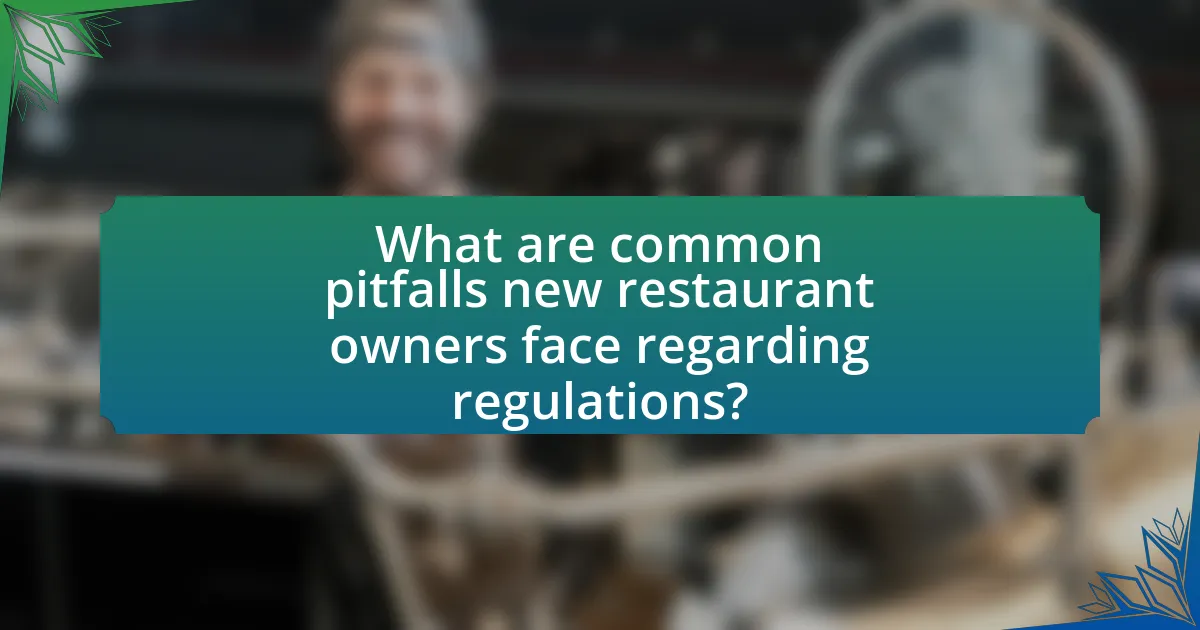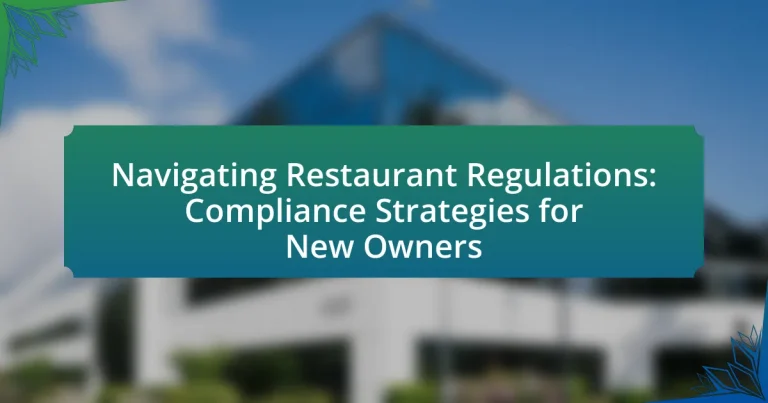The article focuses on the essential restaurant regulations that new owners must understand to ensure compliance and successful operation. Key topics include health and safety regulations, food handling laws, labor laws, and necessary licensing requirements. It emphasizes the importance of adhering to local health codes to prevent foodborne illnesses, outlines specific health regulations for food preparation, and discusses the implications of labor laws on hiring practices. Additionally, the article provides practical strategies for maintaining compliance, including the use of technology, regular training, and networking with other restaurant owners, while highlighting common pitfalls to avoid during the licensing process.

What are the key restaurant regulations new owners need to understand?
New restaurant owners must understand health and safety regulations, food handling laws, labor laws, and licensing requirements. Health and safety regulations ensure that food is prepared and served in a sanitary environment, which is critical for preventing foodborne illnesses. For example, the Food and Drug Administration (FDA) provides guidelines that must be followed to maintain hygiene standards. Food handling laws dictate how food should be stored, prepared, and served, including temperature control and cross-contamination prevention. Labor laws govern employee rights, wages, and working conditions, which are enforced by the Department of Labor. Finally, licensing requirements vary by state and locality, necessitating permits for food service, alcohol sales, and occupancy. Compliance with these regulations is essential for legal operation and to avoid fines or closure.
How do local health codes impact restaurant operations?
Local health codes significantly impact restaurant operations by establishing standards for food safety, sanitation, and employee health. Compliance with these codes is essential for preventing foodborne illnesses, which can lead to legal repercussions and damage to a restaurant’s reputation. For instance, the Centers for Disease Control and Prevention (CDC) reports that approximately 48 million people in the U.S. get sick from foodborne illnesses each year, highlighting the importance of adhering to health regulations. Restaurants must implement proper food handling procedures, maintain cleanliness, and ensure that employees are trained in hygiene practices to meet these local health codes. Failure to comply can result in fines, temporary closures, or even permanent shutdowns, underscoring the critical role that health codes play in the operational viability of restaurants.
What specific health regulations must be followed in food preparation?
Food preparation must adhere to specific health regulations, including proper food handling, sanitation practices, and temperature control. The Food and Drug Administration (FDA) outlines these regulations in the Food Code, which mandates that food establishments maintain cleanliness, prevent cross-contamination, and ensure that food is cooked to safe temperatures to eliminate harmful pathogens. For instance, the FDA recommends cooking poultry to an internal temperature of 165°F (74°C) to ensure safety. Compliance with local health department regulations, which may include regular inspections and adherence to specific food safety training for staff, is also essential for maintaining public health standards in food preparation.
How can new owners ensure compliance with sanitation standards?
New owners can ensure compliance with sanitation standards by implementing a comprehensive sanitation plan that adheres to local health regulations. This plan should include regular training for staff on hygiene practices, routine inspections of food storage and preparation areas, and maintaining proper cleaning schedules. According to the Centers for Disease Control and Prevention (CDC), establishments that follow a structured sanitation program significantly reduce the risk of foodborne illnesses, which is a critical aspect of compliance. Additionally, new owners should familiarize themselves with the specific sanitation codes enforced by their local health department to ensure all practices meet or exceed these requirements.
What licensing and permits are required to operate a restaurant?
To operate a restaurant, several licenses and permits are typically required, including a business license, food service establishment permit, health department permit, and liquor license if alcohol is served. A business license is necessary to legally operate within a specific jurisdiction, while a food service establishment permit ensures compliance with local health regulations. The health department permit verifies that the restaurant meets sanitation and safety standards. Additionally, a liquor license is mandated in most areas for serving alcoholic beverages, which involves a separate application process and adherence to local laws. These requirements can vary by state and municipality, so it is essential for restaurant owners to consult local regulations to ensure full compliance.
What types of licenses are essential for a new restaurant?
A new restaurant requires several essential licenses to operate legally. These typically include a business license, which permits the establishment to conduct business within a specific jurisdiction; a food service license, which ensures compliance with health and safety regulations; and a liquor license, if the restaurant plans to serve alcohol, which is regulated at both state and local levels. Additionally, a signage permit may be necessary for any outdoor advertising. These licenses are crucial for compliance with local, state, and federal regulations, ensuring the restaurant operates within legal boundaries and maintains public health standards.
How can owners navigate the application process for permits?
Owners can navigate the application process for permits by thoroughly researching local regulations and requirements specific to their restaurant type. This involves identifying the necessary permits, such as health permits, business licenses, and signage permits, and understanding the application procedures for each. For instance, many municipalities provide detailed guidelines on their official websites, outlining the steps and documentation needed for permit applications. Additionally, consulting with local health departments or regulatory agencies can provide clarity and assistance in completing applications accurately. Engaging with industry associations or local business networks can also offer valuable insights and support during the process.
Why is understanding labor laws crucial for restaurant owners?
Understanding labor laws is crucial for restaurant owners because compliance with these regulations directly impacts operational efficiency and legal liability. Restaurant owners must navigate complex labor laws, including wage and hour regulations, employee classification, and workplace safety standards, to avoid costly penalties and lawsuits. For instance, the Fair Labor Standards Act mandates minimum wage and overtime pay, and failure to comply can result in fines and back pay claims. Additionally, understanding labor laws helps restaurant owners create a fair workplace, which can enhance employee morale and reduce turnover, ultimately contributing to the restaurant’s success.
What are the minimum wage and overtime requirements for restaurant staff?
The minimum wage for restaurant staff varies by state and locality, with the federal minimum wage set at $7.25 per hour. However, many states have established higher minimum wage rates; for example, California mandates a minimum wage of $15.50 per hour as of 2023. Overtime requirements stipulate that restaurant staff must be paid one and a half times their regular rate for hours worked over 40 in a workweek, as per the Fair Labor Standards Act (FLSA). This means that if a restaurant employee earns $15 per hour and works 45 hours in a week, they would receive $15 for the first 40 hours and $22.50 for the additional 5 hours, totaling $712.50 for that week. Compliance with these wage and overtime regulations is crucial for restaurant owners to avoid legal penalties.
How do labor laws affect hiring practices in the restaurant industry?
Labor laws significantly influence hiring practices in the restaurant industry by establishing minimum wage standards, overtime regulations, and anti-discrimination policies. These laws require restaurant owners to ensure compliance with wage laws, which affects how they budget for staffing and determine pay rates for new hires. For instance, the Fair Labor Standards Act mandates that employees must be paid at least the federal minimum wage, which as of 2023 is $7.25 per hour, impacting the hiring of staff at competitive wages. Additionally, laws such as the Equal Employment Opportunity Act prohibit discrimination based on race, gender, or age, compelling restaurant owners to adopt fair hiring practices and implement training programs to avoid legal repercussions. Consequently, adherence to these labor laws shapes the recruitment process, influencing the selection criteria and the overall workforce composition in the restaurant sector.

How can new restaurant owners effectively ensure compliance?
New restaurant owners can effectively ensure compliance by thoroughly understanding and adhering to local, state, and federal regulations. This involves researching health codes, food safety standards, labor laws, and licensing requirements specific to their location. For instance, the Food and Drug Administration (FDA) provides guidelines that must be followed to maintain food safety, while the Occupational Safety and Health Administration (OSHA) outlines workplace safety regulations. Additionally, engaging with local health departments for inspections and obtaining necessary permits can further solidify compliance efforts. Regular training for staff on compliance-related topics is also crucial, as it fosters a culture of adherence to regulations within the establishment.
What strategies can be implemented for ongoing regulatory compliance?
To ensure ongoing regulatory compliance in the restaurant industry, owners should implement a comprehensive compliance management system. This system should include regular training for staff on current regulations, routine audits of operations to identify compliance gaps, and the establishment of a clear communication channel for reporting compliance issues.
For instance, the National Restaurant Association emphasizes the importance of continuous education and training programs to keep staff updated on food safety, labor laws, and health regulations. Additionally, conducting quarterly compliance audits can help identify areas needing improvement, thereby reducing the risk of violations. By fostering a culture of compliance and accountability, restaurant owners can effectively navigate the complex regulatory landscape.
How can regular training help staff stay informed about regulations?
Regular training helps staff stay informed about regulations by providing updated knowledge and skills necessary for compliance. This ongoing education ensures that employees are aware of the latest legal requirements, industry standards, and best practices. For instance, a study by the National Restaurant Association found that establishments with regular training programs experience a 20% reduction in compliance violations. This demonstrates that consistent training not only enhances staff awareness but also significantly improves adherence to regulations, ultimately fostering a culture of compliance within the organization.
What role does technology play in maintaining compliance?
Technology plays a crucial role in maintaining compliance by automating processes, ensuring accurate record-keeping, and facilitating real-time monitoring of regulatory requirements. For instance, restaurant management software can track inventory levels and expiration dates, helping owners adhere to food safety regulations. Additionally, compliance management systems can streamline documentation and reporting, reducing the risk of human error. According to a study by the National Restaurant Association, 70% of restaurant operators reported that technology improved their ability to comply with health and safety regulations. This demonstrates that leveraging technology not only enhances operational efficiency but also strengthens compliance efforts in the restaurant industry.
How can new owners stay updated on changing regulations?
New owners can stay updated on changing regulations by subscribing to industry newsletters and following relevant government websites. These resources provide timely updates on local, state, and federal regulations affecting the restaurant industry. For example, the U.S. Small Business Administration and local health departments often publish changes in compliance requirements, ensuring that owners have access to the latest information. Additionally, joining industry associations, such as the National Restaurant Association, offers networking opportunities and access to resources that keep members informed about regulatory changes.
What resources are available for tracking regulatory changes?
Resources available for tracking regulatory changes include government websites, industry associations, and regulatory compliance software. Government websites, such as the U.S. Small Business Administration and local health department sites, provide updates on regulations affecting restaurants. Industry associations, like the National Restaurant Association, offer newsletters and alerts on legislative changes. Regulatory compliance software, such as Comply365 or Zenput, helps businesses monitor and manage compliance requirements in real-time. These resources ensure that restaurant owners stay informed about relevant regulatory changes that impact their operations.
How can networking with other restaurant owners provide insights?
Networking with other restaurant owners can provide insights by facilitating the exchange of best practices and compliance strategies. Engaging with peers allows owners to share experiences regarding local regulations, permitting processes, and health codes, which can vary significantly by location. For instance, a study by the National Restaurant Association found that 70% of restaurant owners who networked reported improved knowledge of compliance issues, leading to fewer violations and better operational efficiency. This collaborative environment fosters learning and adaptation, ultimately enhancing the ability to navigate complex regulatory landscapes effectively.

What are common pitfalls new restaurant owners face regarding regulations?
New restaurant owners commonly face pitfalls such as failing to understand local health codes, neglecting licensing requirements, and overlooking labor laws. These oversights can lead to fines, business interruptions, or even closure. For instance, according to the National Restaurant Association, 75% of new restaurants fail within the first five years, often due to regulatory non-compliance. Additionally, many owners underestimate the complexity of food safety regulations, which can vary significantly by location, leading to potential health violations. Understanding and adhering to these regulations is crucial for long-term success in the restaurant industry.
What mistakes should be avoided when applying for licenses?
When applying for licenses, new restaurant owners should avoid incomplete applications, as they can lead to delays or rejections. Submitting all required documentation, including proof of identity, business plans, and health inspections, is crucial for a smooth approval process. Additionally, overlooking local regulations can result in non-compliance; therefore, researching specific requirements for the area is essential. Failing to meet deadlines for submissions can also hinder the licensing process, as many jurisdictions have strict timelines. Lastly, neglecting to seek professional advice when needed can lead to costly mistakes, as experts can provide guidance on navigating complex regulations effectively.
How can incomplete applications lead to delays in opening?
Incomplete applications can lead to delays in opening by causing regulatory review processes to stall. When a restaurant submits an application that lacks necessary information or documentation, regulatory agencies cannot proceed with their evaluations, which are essential for granting permits and licenses. For instance, a study by the National Restaurant Association found that incomplete submissions can extend the review period by an average of 30 days, significantly impacting the timeline for opening a new establishment. This delay can result in lost revenue and increased operational costs for new owners, as they are unable to commence business as planned.
What are the consequences of ignoring health code violations?
Ignoring health code violations can lead to severe consequences, including fines, closure of the establishment, and legal action. Health departments enforce regulations to ensure public safety, and failure to comply can result in monetary penalties that vary by jurisdiction, often ranging from hundreds to thousands of dollars. Additionally, repeated violations can lead to the suspension or revocation of a restaurant’s operating license, effectively shutting down the business. Legal repercussions may also arise, including lawsuits from affected customers, which can further damage the restaurant’s reputation and financial stability. According to the Centers for Disease Control and Prevention, foodborne illnesses linked to violations can lead to significant public health risks, emphasizing the importance of adherence to health codes.
How can new owners learn from the experiences of others?
New owners can learn from the experiences of others by actively seeking mentorship and engaging in industry networking. Mentorship provides direct insights from seasoned restaurant owners who have navigated similar regulatory challenges, allowing new owners to understand compliance strategies that have proven effective. Additionally, participating in industry associations or forums enables new owners to share experiences and gain knowledge from a broader community, which can highlight common pitfalls and successful practices. Research indicates that mentorship can significantly enhance business success rates, with studies showing that mentored businesses often experience faster growth and improved compliance with regulations.
What case studies illustrate successful compliance strategies?
Successful compliance strategies in the restaurant industry can be illustrated by the case studies of Chipotle Mexican Grill and Starbucks. Chipotle implemented a comprehensive food safety program following a series of foodborne illness outbreaks, which included rigorous supplier audits, employee training, and enhanced food handling procedures. This strategy resulted in a significant recovery in customer trust and sales, as evidenced by a 17% increase in revenue in the year following the implementation of these measures.
Starbucks, on the other hand, has successfully navigated compliance with labor laws and health regulations by adopting a proactive approach to employee training and engagement. The company established a robust compliance framework that includes regular audits and employee feedback mechanisms, leading to a 10% reduction in compliance-related incidents over three years. These case studies demonstrate that effective compliance strategies not only mitigate risks but also enhance brand reputation and operational efficiency.
How can mentorship programs assist new owners in navigating regulations?
Mentorship programs assist new owners in navigating regulations by providing expert guidance and personalized support tailored to the specific regulatory landscape of the restaurant industry. Experienced mentors can share their knowledge of local, state, and federal regulations, helping new owners understand compliance requirements such as health codes, labor laws, and licensing procedures. For instance, a study by the Small Business Administration found that businesses with mentors are 70% more likely to survive than those without, highlighting the effectiveness of mentorship in fostering compliance and operational success.
What practical tips can help new restaurant owners navigate regulations effectively?
New restaurant owners can navigate regulations effectively by thoroughly researching local, state, and federal laws relevant to the food service industry. This includes understanding health codes, labor laws, and licensing requirements. Engaging with local health departments and regulatory agencies can provide clarity on compliance expectations. Additionally, utilizing resources such as the Small Business Administration and industry associations can offer guidance and support. Keeping organized records of all permits, inspections, and communications with regulatory bodies is crucial for maintaining compliance and addressing any issues that may arise.
How can creating a compliance checklist streamline operations?
Creating a compliance checklist streamlines operations by providing a structured framework for meeting regulatory requirements efficiently. This checklist helps restaurant owners systematically identify, track, and fulfill necessary compliance tasks, reducing the risk of oversights that could lead to fines or operational disruptions. For instance, a study by the National Restaurant Association indicates that businesses with organized compliance systems experience 30% fewer regulatory violations, demonstrating the effectiveness of checklists in maintaining adherence to laws and regulations.
What best practices should be followed for regular audits and reviews?
Regular audits and reviews should follow best practices such as establishing a clear audit schedule, involving a qualified team, and utilizing standardized checklists. A clear audit schedule ensures consistency and accountability, while a qualified team brings expertise to identify compliance gaps. Standardized checklists facilitate thorough evaluations and help maintain focus on critical regulatory requirements. According to the Institute of Internal Auditors, organizations that implement regular audits can reduce compliance risks by up to 30%, demonstrating the effectiveness of these practices in enhancing regulatory adherence.




